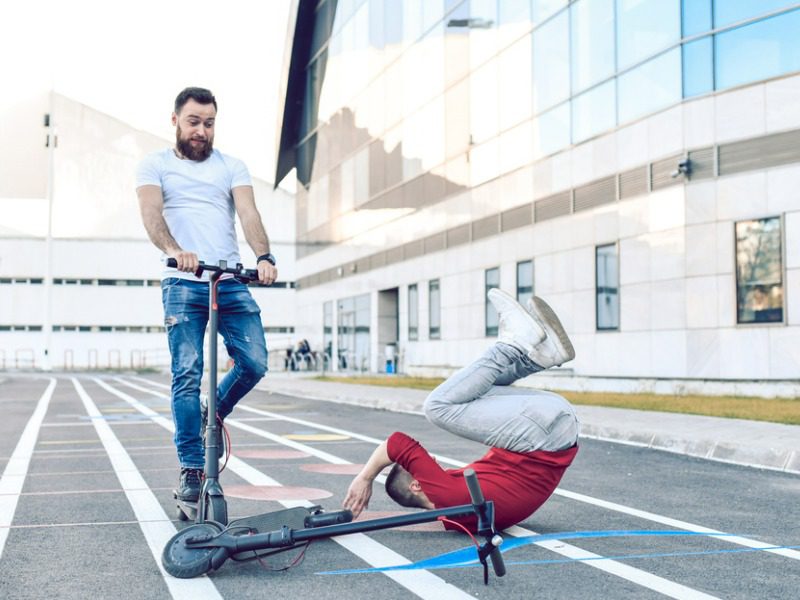Whose insurer pays when e-scooter drivers crash?

News reports about drivers of stand-up e-scooters injuring pedestrians in several Canadian cities are raising questions about insurance coverage for the vehicles — and how injured pedestrians might recover damages.
But what about the e-scooter drivers themselves? Can they recover damages from insured entities like cities or private-property owners if they’re harmed while driving an e-scooter?
“In a situation where an e-scooter rider hits a pothole in the road or an obstruction on the sidewalk, it’s going to be difficult for that person to recover compensation. There’s certainly not going to be any sort of statutory accident benefits coverage,” said Tim Crljenica, partner at law firm Thomas Gold Pettingill.
“Unless the e-scooter rider has health benefits or disability benefits of their own, their only potential recourse is against the municipality.”
Cities may be on the hook
Case law around municipal liability is expansive and well developed, Crljenica noted. “Most municipal case law relates to slip and falls, but it’d be the same principles that apply.”
For e-scooter drivers, the closest analogy to a pedestrian slip and fall on an improperly maintained street or sidewalk is a pothole or sidewalk discrepancy that is larger than allowed by a city’s road maintenance bylaws.
That includes a pothole’s width, but more importantly its depth since the distance a scooter’s wheels fall into, or must rise to climb out of, a pothole can make the difference between safe travel and a catastrophic fall. Height concerns also are the primary factor when e-scooter drivers encounter a sidewalk discrepancy.
“The minimum maintenance standards are what is applicable to municipal sidewalks, roads, etc., and determines what is considered an unacceptable hazard,” Crljenica told CU. “If the hazard doesn’t breach those standards, then there’s not going to be any recovery of damages from the municipality.”
In cases where a sidewalk discrepancy or pothole falls within the parameters of the bylaw, and there’s no automobile involved, there’s likely no recovery against another party, even if an e-scooter driver’s fall results in something as serious as a brain injury.
“The only insurance that the e-scooter rider might have is their own medical benefits coverage through work or elsewhere, and disability benefits coverage,” Crljenica said. “But that might depend on the person’s decision to have purchased insurance for themself beforehand.”
Measuring up
If plaintiffs ever decided to systematically go after municipalities over minor sidewalk or roadway discrepancies that were larger than they’re supposed to be under a city’s maintenance standards, they’d likely do well, Crljenica said.
“I’ve seen many cases where the sidewalk discrepancy is marginal. A discrepancy in the sidewalk even a single millimeter over the permitted standards can make or break a person’s case against a municipality – and allow the person to recover from the municipality or its insurer,” he added.
“Sometimes you have incidents involving multiple defendants, and many will not have insurance. Municipalities, quite often, will bear more than their proportionate share when a judge wants to apportion liability. The way the law works is the injured person can recover 100% from any one of the liable parties. That liable party can then pursue the proportionate shares from the other parties.
“For example, if an e-scooter driver injures someone and a sidewalk discontinuity contributed to the accident, a judge might says it’s 75% on the scooter driver and 25% the municipality’s fault. That injured person would be able to receive 100% compensation from the municipality, and the municipality can pursue its crossclaim against the e-scooter driver to seek the 75% portion [from] the driver. But the success of recovery will turn on the driver having responding insurance or having assets to seize or wages to garnish.”
Likewise, in a case where an e-scooter driver without insurance injured someone on private property, such as a commercial parking lot, the compensation burden would fall to the insurable party, such as the parking lot owner.
“Often, the party with insurance [will] bear the full loss rather than the person who maybe actually has the most liability,” Crljenica said.
Feature image courtesy of iStock.com/AleksandarGeorgiev



